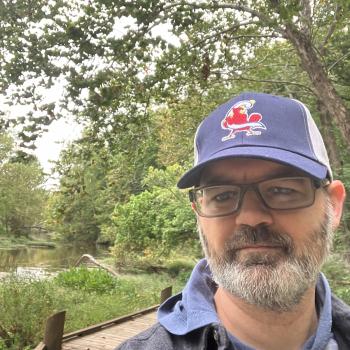In short, by my time, contemplation in most Christians' minds meant being an introverted personality: liking quiet, sometimes not liking people, or not liking noise. So that needed to be unpackaged, and I think we're twenty-some years into that un-packaging now.
Well now, let's take that word "contemplation." Can you un-package that for us? I mean, what are you talking about here?
Richard: Well let's start with it, the Latin word, contemplat, is seeing, not thinking. So it's a more holistic way of accessing the moment than just the left-brain. I like to call it "undefended knowing," where you keep the screen open, you refuse the dualistic, antagonistic "it's either this or that," which is the way most people prefer to think. They don't know it. So when you refuse this "it's either this or that," you get your usual defenses out of the way of anger, agenda, fear, and judgment. The more you can remain undefended and keep the screen open, I think you have an easier possibility of contemplating a situation.
"Undefended knowing," that sounds very vulnerable to me. What kind of risk-taking or courage does that invite from those who want to enter the contemplative path?
Richard: I think you just named the heart of the problem: that the ego is very defended—that's almost its definition—and vulnerability, exposure, self-disclosure, that isn't our natural language; I think you've just named the primary reason people don't try to learn the contemplative stance, or if they do learn it, they run from it, because to stay there, even for twenty minutes, undefended, without returning to my obsessive, compulsive, repetitive patterns, that's a lot of letting go. And who wants to do that? If there isn't a wise teacher to tell you, "it's okay," and it's not only okay, but it's better, it's good.
Tilden: I think one thing that really helps is for people to come to understand that our ego and our mind's thinking are not the only ways we can know something, the only places that tell us where we are, and who we are. There is this whole historic faculty identified in contemplative tradition that we can call our spiritual hearts, which is not just a matter of willing and feeling, but is a matter of knowing. It's a quality of intuitive awareness. When a person is in that quality of presence—with the help of others who can let them trust what's happening there—a sense of inclusive, compassionate, undefended, direct in-touch-ness with what is really there and going on can develop. That provides a whole different possibility for a way of living in human community and of going deeper in your own awareness as the ground for making your decisions and for letting go what gets in the way of that deeper, freer, confident way and place of being.
These years of experience with the contemplative way sounds almost like a foreign language, an unknown land, an experience that's unfamiliar, and really, that direct in-touch-ness with what is really real is almost an awakening.
Tilden: It's a way of finding our true home, finally, so it's not alien once people really touch it.
So what does contemplative practice bring to the world today?
Richard: It un-trains us in the reactive response, which is almost always a narcissistic response. It un-trains us in an obsessive-compulsive response, which, now the study of neurons is telling us, most responses are; they're repetitive and compulsive. They're habitual; they're practiced. So when you stop practicing them, as you both know, you stop habituating them, you open up the field. That's, on a very physiological basis, what we're doing. That changes everything.
Tilden: Well, I would certainly agree with what Richard has said, just to word it maybe a little differently—the practice allows you to drop beneath those reactive places that come from an identification with your separate ego sense of self, and with your mind's capacity to think. It draws you toward a deeper place of awareness in you, awareness of reality as it is, where you touch into what you experience as much more your real self and your real home, and it's a place that's not just your private self and home, but it's one that belongs, you know, it belongs to God. It belongs in connection to the whole creation, and you no longer see yourself acting day by day as just this separate, independent self trying to fragilely protect what you have and to get something more, but you're functioning from a much freer, deeper, clearer, place in you that allows the world, I think, to become a different place.
I want to thank the two of you for rediscovering the contemplative lineage within our own Christian tradition, the mystical tradition, and for bringing this forward for all of us today.
Visit The Shalem Institute for Spiritual Formation or follow them on Twitter and Facebook.




